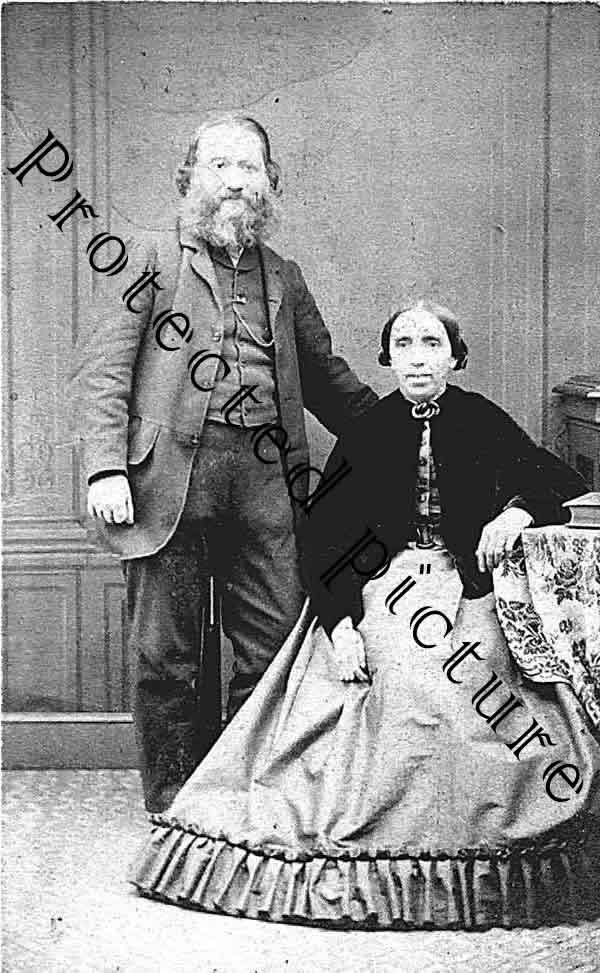Marriage and the earliest publications
Edition 15 of George's newspaper, a year after his difficulties with
Braithwaite, appeared on 1st January 1844 and in it he entered the announcement
of his marriage to Elizabeth Cole on the previous day, 31st December
1843. Clearly the event had not been allowed to hold up publication,
but what it had achieved was the bringing together of the familes of
three Cleveland personalities; George's grandfather, John Tweddell;
his grandmother's brother, Christopher Rowntree ("Gentleman Kitty");
and Elizabeth's grandfather, Thomas ('Tommy') Cole, the stable master
to Robert Challenor, the chief landowner in Guisborough and whose descendents
were to become Lord Gisborough (sic). The exploits of the three friends
were legendary and were celebrated by John Jackson in his poem, The
Cleveland Fox-Chase, which George republished in Bards and Authors in 1872 adding an account about each person.
As the couple started their family almost immediately, Elizabeth had
little time during the next two decades to satisfy any literary aspirations
she might have. Following the collapse of his newspaper,
George started putting his energies into writing and publishing books
and magazines. Amongst the latter (published by George's older half-brother,
Thomas, 1817-85 and a former apprentice of Braithwaite) was Tweddell's
Yorkshire Miscellany and Englishman's Magazine (1844-46) which John
Ord encouraged by offering articles of his own for inclusion, proof-reading
it and defending George from a similar, rival magazine being planned
in neigh-bouring Stockton on Tees. The ambition of George's magazine
was high-toned aiming to attract readers who desired "intellectual
elevation and the reformation of public morals", a principle in
harmony with Prince Albert's moral crusade at the time. It was published
quarterly with, a mixture of poems, local legends, and tales with a
moral or philosophical message. There were too a few general articles,
often of quite revolutionary ideas for the time, such as 'On the advancement
of Education', which advocated a universal simplified spelling system
in education based on the work of Isaac Pitman, 'On the usefulness of
Geography' and a series, 'Remarks on the sympathy existing between the
Body and the Mind', an essay on what was later to be known as psychology,
and particularly interesting because the author who submitted the article
was John Ord who killed himself after enduring a number of years with
a deranged mind. George's personal copy of this book survives and is
annotated in his hand. There were also comments made by others about
many of the items, and original letters stuck between the related pages
(including one from Ord). Although published in instalments, it seems
that many owners had planned to bind the separate booklets together
on the completion of the series, as George did with his own copy, so
four extra sheets became available to add a title page, a dedicatory
page and two of contents. In the introduction the editor made an appeal
to his Yorkshire audience: "With a population of one million, five
hundred and ninety-one thousand, four hundred and eight souls, it cannot
be denied, by any rational man, that Yorkshire stands in need of a Periodical
entirely devoted to Literature, Science and the Fine Arts; ……
and surely Yorkshiremen are not so completely immersed in the Stygian
waters of ignorance, as to be unable to support us in our undertaking."
Sadly this appeal for support was disappointing as it became obvious
to George that he had misread the financial viability of the venture.
Before embarking on a second series he invited subscriptions more cautiously:
"In consequent of the heavy loss incurred by the Editor in his
attempt to establish a Magazine for his native County, the publication
of this work is suspended. …… For a second volume subscribers'
names [are] to be forwarded to the Editor, Stokesley." Unfortunately
the number collected was too small to proceed, so, except for The
Odd Fellows Reciter and Fireside Companion (1852), most books were
offered to companies in London for publication; George's update of Goldsmith's
History of England (Brittain, 1848); Shakspeare - His Times and
Contemporaries (Kershaw, 1852); and Modern Yorkshire Poets (Marshall, 1855). The second book brought George considerable renown,
and sufficient support to justify a second edition in 1861 prepared
whilst he was working in Lancashire and published shortly after his
return to North Yorkshire.
|

